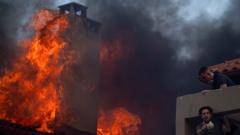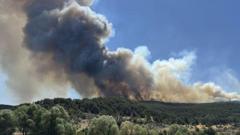Particulate pollution due to Canadian wildfires has raised concerns in the U.S. Upper Midwest, leading officials to issue health advisories for several states.
Smoke From Canadian Wildfires Envelops Upper Midwest: Health Alerts Issued
Smoke From Canadian Wildfires Envelops Upper Midwest: Health Alerts Issued
Health warnings in multiple states as smoke travels south from devastating wildfires in Canada.
By Christine Hauser
May 30, 2025, 2:57 p.m. ET
Smoke from destructive wildfires in Canada has begun to permeate the air in several regions of the United States, prompting health warnings across the Upper Midwest. On Friday, authorities alerted residents of Michigan, Wisconsin, and Minnesota about deteriorating air quality conditions that may persist for several days.
Meteorologists from Michigan's Department of Environment, Great Lakes and Energy estimated that fine particulate matter would remain elevated through Saturday morning, leading to advisories for vulnerable populations. Sensitive groups, including individuals with heart or lung conditions, the elderly, children, and pregnant individuals, were advised to limit outdoor activities to minimize health risks associated with the smoke inhalation.
Recent reports indicated that wildfires in Flin Flon, Manitoba, have been particularly severe, resulting in tragic loss of life and community displacement. The wildfire season in Canada generally spans from March through October, with increased fire activity typically seen in May. Unfortunately, the situation has escalated with multiple wildfires raging out of control in Saskatchewan and Manitoba, forcing thousands of residents to evacuate their homes.
This week, a cold front has driven smoke from the wildfires southward into Minnesota, affecting woodland areas and tribal territories. The smoke has prompted air quality index readings to reach the "red" level, indicating conditions that are particularly hazardous for many in the population. Minnesota's Pollution Control Agency has issued warnings, confirming that the duration of this smoke incident could be prolonged due to additional smoke systems expected to roll in throughout the next few days.
In Wisconsin, health officials have forecast additional haze and elevated pollution levels stemming from the ongoing Canadian wildfires. The Department of Natural Resources in Wisconsin has placed the region under a weather advisory until early Saturday, noting that smoke impacts might extend into other areas, with possible increases in air quality alert levels to "orange" or even "red."
As residents brace for the effects of this environmental crisis, health officials remind the public to stay indoors when possible and to stay informed about updates regarding air quality conditions.


















